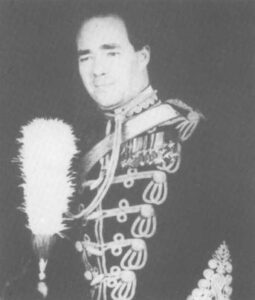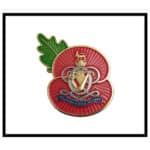Rowland Winn was educated at Stowe and the Universities of Bonn and Freiburg.

He then became a newspaper Correspondent in Spain, first for Reuters, then for the Daily Telegraph, and in 1936 became their War Corespondent. This latter job landed him in prison twice, once in Madrid and once in Barcelona, where he was sentenced to death by the Anarchists . His rescue was organised from London by the first Viscount Camrose. He was also a correspondent in Jordan and the Balkans.
In 1939 he was one of the first two Englishmen to cross into Albania since Mussolini’s invasion.
On the outbreak of war he found himself in Dubrovnik, crossed Europe and enlisted in London.
He joined the 8th Hussars in the desert and led a troop for a while with great dash, serving also with us in Cyprus.
Being fluent in French, German and Spanish he was asked for by Special Operations and was shortly afterwards dropped by parachute in Yugoslavia in support of General Mikhailovitch, breaking his leg in landing. Hardly had he landed when the British Government transferred their support to Tito. Rowland made his way, after many adventures, out of Yugoslavia.
In 1945 he was again dropped by parachute, this time into the Siamese jungle. He finished fighting the Annamites in support of the French in Indo-China.
With the war over he spent much time at his villa in the south of Spain, a country he loved, and was known locally as ‘Don Rolando’. He even tried his hand at bull-fighting, not, I think, with much success. Eric Norris and I were staying with him in Spain, when we were ordered home to go to Korea. Rowland said that he would be along shortly.
As the troopship was about to leave for Korea, an individual in civilian clothes came aboard. He had not been called up and was ordered ashore. Of course Rowland refused. For a while the War Office refused to allow him to be put on the strength or to pay him. Eventually the War Office recognised his existence and he was, I think, gazetted as a Captain.
In Korea he went to the Belgian Battalion as 29 Brigade Liaison Officer. The Belgians thought highly of him and decorated him with the Croix de Guerre and The Order of Leopold. He was also awarded the Military Cross.
He nearly lost his life in the Battle of the Imjin River. Unable to run with his damaged leg, he was picked up by a ‘C’ Squadron tank in the nick of time.
Life in the icy and uncomfortable Korean winter was made infinitely more tolerable for those of us in ‘B’ Squadron by the witty, challenging presence of Rowland. You needed to have your wits about you to keep pace with his rapier-quick mind (or to hold your own with him at backgammon), and at every mealtime we were entertained by this best of raconteurs.
We loved to show him off to visitors, for Rowland was an absolutely key member of the 8th Hussars whose powerful and engaging personality made such an impression especially on our Belgian and American allies.
He also, perhaps more clearly than any of us, understood for what purpose we were fighting and why it was all worthwhile. The only time I saw him lose his temper was with an allied soldier who was mistreating a Korean youth, an action he saw as utterly contrary to all reason for our being there at all.
His high hearted resolution and uncompromising sense of rightness made it a joy and a privilege to serve with such a remarkable man.
After the Korean War he entered politics seriously, and after his succession to the title spoke often in the House of Lords.
Whilst the Regiment was stationed in Paderborn, he generously fitted out the Pipers with uniforms and presented several sets of Bagpipes, one of which, naturally, had his Arms on the Banner.
A flamboyant unusual man whose sense of duty and love for his Regiment were intense. An amusing companion and a very good friend, who will be much missed by all who knew him.



